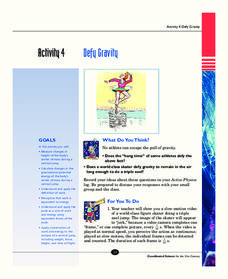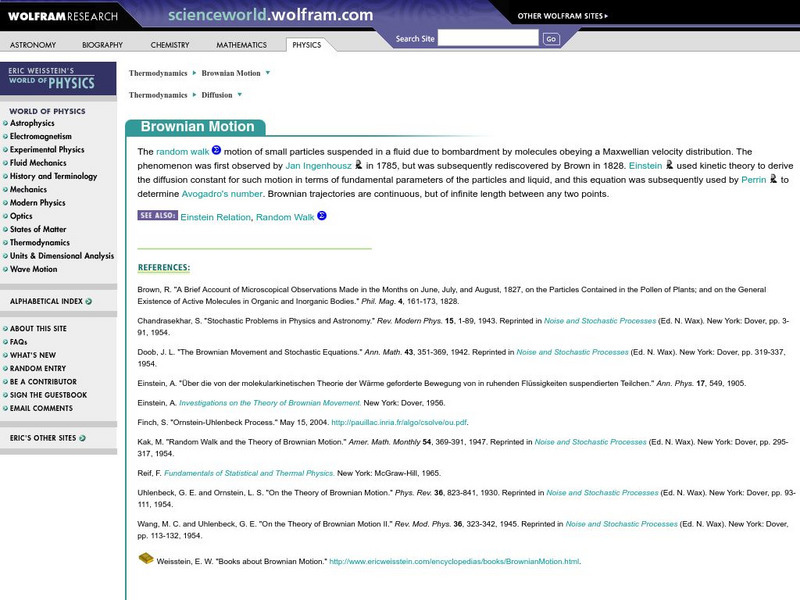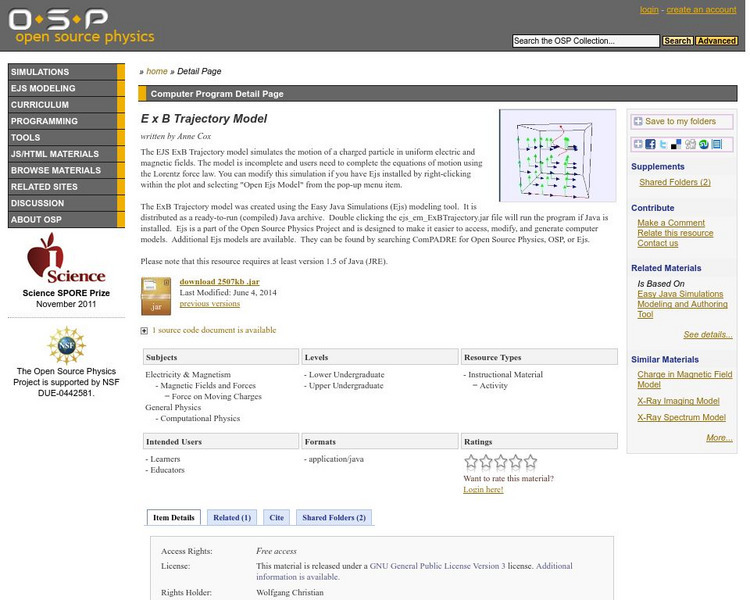It's About Time
Circular Motion
Lead your class in this exciting activity to learn more about motion and its importance. Pupils learn about a centripetal and why it is required to maintain a constant speed in a circulating moving mass. They apply the equation for...
It's About Time
AC and DC Currents
An informative physics lesson includes two teacher demonstrations, one on AC currents and the other on DC currents, allowing pupils to take notes while watching. The resource includes questions to assign as homework or...
Oregon State
World Map of Plate Boundaries
Young geologists piece together the puzzle of plate tectonics in an earth science lesson. Given a physical map of the world, they search for land formations that indicate the location of different types of plate boundaries.
CPO Science
Potential and Kinetic Energy
Here's a resource ideal for independent learners who need extra reinforcement or would like to work ahead. These textbook chapters and practice problems cover many basic physics concepts, starting with potential and kinetic energy and...
Weber State University
The Sun and the Seasons
Why is there more daylight in June than in December if you live above the equator? How does the angle of sunlight shift throughout the year? Answer these questions and more with an interactive article about the sun, its path through the...
It's About Time
Run and Jump
Has your class wondered how fast a human could run or how high they are capable of jumping? Help them understand these concepts as they explore acceleration and use an accelerometer to make semiquantitative measurements of acceleration...
Laboratory for Atmospheric and Space Physics
The Planets and Scale
Scholars gain an insight into the relative size of planets and distance between inner and outer planets with the help of informational text, a data table, and a series of four questions.
Purdue University
Healthy Body Image: Healthy Exercises for Every Body
From three-way neck rolls to a figure-5 hurdler's stretch, this is an ultimate guide to healthy exercises. It begins with a bulleted list of general guidelines on cardiorespiratory exercise, flexibility, resistance exercises, and range...
NASA
Water Rocket Launcher
How can you launch an object that isn't propelled by air? The resource provides directions to build a launcher to launch rockets made of two-liter bottles. The launcher, built mainly from materials found at the local hardware...
It's About Time
Defy Gravity
Test the limits of gravity while encouraging full class participation with this thrilling lesson. Pupils investigate the meaning of work and how it is equivalent to energy. They explore the joule and apply it as a unit of work. They...
It's About Time
The Mu of the Shoe
What is mu? Emerging scientists explore the coefficient of sliding friction, or mu, and apply its concepts as they complete activities in the interesting lesson. They measure the sliding friction between soles of their own athletic shoes...
It's About Time
The Electricity and Magnetism Connection
Magnets don't grow in fields, but magnetic fields are important to understand. The lesson covers the effect electricity has on magnetic fields. Scholars use a compass, magnets, and electrical wire to test magnetic fields and energy...
Science Struck
Science Struck: A Comprehensive List of All the Physics Formulas
Provides a long list of physics formulas for easy reference.
American Association of Physics Teachers
Com Padre Digital Library: Open Source Physics: Copernican System Model
The Copernican system of planetary motion is clarified in this simulation.
American Association of Physics Teachers
Com Padre Digital Library: Open Source Physics: Celestial Globe Model
Users have the opportunity to adjust several variables in this simulation demonstrating the Ancient Greek's Two Sphere Universe theory.
Wolfram Research
Wolfram Science World: Brownian Motion
This site from ScienceWorld gives a brief description of Brownian motion. It also goes on with a detailed series of formula derivations utilizing calculus. Links to related topics and definitions are given.
Ducksters
Ducksters: Physics for Kids: Speed and Velocity
Kids learn about speed and velocity in the science of physics and the laws of motion including units and measurement. What is the difference between speed and velocity?
American Association of Physics Teachers
Com Padre Digital Library: Open Source Physics: E X B Trajectory Model
Simulate the motion of a charged particle in electric and magnetic fields, and then complete the equations of motion using the Lorentz force law.
Science Struck
Science Struck: 8 Albert Einstein Inventions That Impacted the World
Describes the refrigerator invented by Einstein and many of his discoveries in physics.
Florida State University
Florida State University: Science, Optics & You: Sir Isaac Newton
Biography of Sir Isaac Newton (1642-1727), a scientist whose impact is felt in many disciplines today. His laws of motion are integral to basic physics, and he co-invented calculus.
Science Struck
Science Struck: The Accomplishments of Isaac Newton
Read about the life of Isaac Newton and his many accomplishments in physics, mathematics, optics, and religious study, and how his discoveries helped in space research.
University of Sydney (Australia)
Thermal Physics Module/temperature and Heat [Pdf]
A lengthy set of lecture notes on the distinction between heat and temperature. The science of thermography is introduced; the Kelvin temperature scale is explained and compared to the Celsius temperature scale. The meaning of a triple...
Science Struck
Science Struck: Understanding the Gyroscopic Effect
Explains what a gyroscope is and the physics behind how it works.
American Association of Physics Teachers
Com Padre Digital Library: Open Source Physics: Gimbal Model
Simulate the pitch, roll and yaw of a 3D object on this Gimbal Model. Investigate the change at each independent axis by rotating it around specific points.


















